Rightly not trusting our leaders to deliver on their statements (there were, IFUC, no promises about leaving the EU from Mrs May), the Sage of Kettering and I have left the EU in that recently, we have visited our nearest escape hole, the Channel Islands. A fleeting visit, one day in each, but we have seen a future, and it works, more or less. For our more distant readers, Jersey and Guernsey are ‘Crown Dependencies’, historically part of the Duchy of Normandy, owing allegiance to the British Crown but not part of the UK. The UK government has arrogated to itself the overlordship of the islands, holding responsibility for foreign affairs and defence (well, sort of, as we shall see), but the two Bailiwicks are otherwise independent jurisdictions with autonomy in most areas, crucially taxation, and are outside of the European Union, albeit within EU Customs arrangements, allowing them to trade with the EU. Here, they say, the Queen is the Duke of Normandy, although monuments refer to ‘la Reine’. She is the only Duke I can think of married to a Duke. Whether or not they can simply declare independence is constitutionally unclear, but with Labour dangerously close to power, they might be advised to make some plans.
We flew into Jersey, at our departure airport in the UK, a government advert, a stark reminder of how Orwellian the UK is, and note the gentle stab at diversity in the poster.

Our first stop in a windy and rainy Jersey being the ‘War Tunnels’ a German Underground Military Hospital from WW2.
Like quite a few residences here, there is a Porsche sitting around, probably one of the first on the island.

The hospital is now a museum of the German occupation. After the fall of France, came the signal informing the Islands’ governments that they will ‘not, repeat not’ be defended against attack by sea or air. There is a poignant poster on the difficult ‘choice’ facing the islanders, the echoes today being a pure co-incidence:
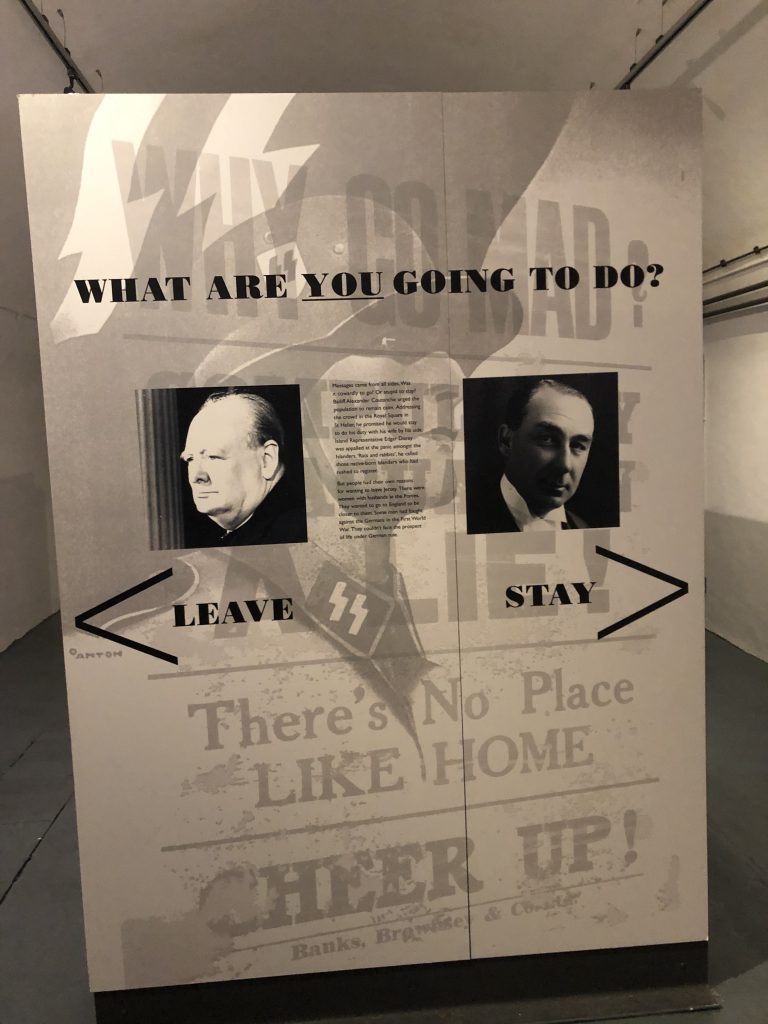
However, it wasn’t all about choice, many had none. One British-born Jewish woman remained, and was eventually deported to Europe. Remarkably (and telling, for the efficiency of the operation), after protests from the Jersey Bailiff (the nominal head of the Island’s government), she was repatriated directly to the UK in 1944. She said later that she’d never be honest again, having obediently registered herself as a Jew. She only needed to never have trusted government again.
As it became clear that the Islands weren’t going to be defended, there was, understandably, panic. Some chose to leave, and before getting on a boat, found that their houses had been burgled between them leaving their house and getting off the Island.
The tunnels tell the grim story of the Occupation. German rules, anti-Jewish laws, price controls (this from the people who gave the world wheelbarrow inflation), enslavement, starvation and death. One Jersey woman, Louisa Gould, who had lost a son in the Royal Navy in 1941, was deported to Ravensbrück for sheltering a Soviet PoW slave worker, and keeping a radio, and was worked to exhaustion in the camp, and was gassed in February 1945 when no longer able to work. So powerful was the Reich and its ideas, it had to gas this lady lest her example cause them trouble.
The museum is not afraid to address the collaboration between the government and the Nazi occupiers, it offers a replay of a conversation between the Bailiff and the Attorney-General, discussing a German order to mandate the confiscation of radios, the gist of which is that they will pretend to enforce the edict by, er, …enforcing it. (Yes, you read that right). There was also an indication that Mountbatten wanted to invade the islands in a plan that sounded as if the Dieppe Raid hadn’t been enough pointless slaughter in one operation, but Bomber Harris would have none of it. There were also collaborators, some of whom, post-Liberation on 9th May 1945, were hidden in the Island’s prison for months, before being shipped to Bristol. Women who formed relationships with German soldiers were called ‘Jerry-bags’. Denunciations were used to settle scores, but some crafty postal workers steamed open the letters, read them, tipped off the targets and then forwarded the letters, enabling covert radios or other evidence to be disposed of.
The War Tunnels were rather more circumspect about the Soviets, who had, after all, been in a pact with the Nazis when the Occupation started. The museum’s signs referred to the ‘Fascist’ ideology of the occupiers, not ‘National Socialist’, it became apparent why. In making the exhibition, the museum had some support from a Jersey Marxist organisation, who somehow omitted to mention the Nazi-Soviet Pact in force when the Occupation started, which literally fuelled the invasion of France. Regarding one of the surviving Soviet PoWs, it noted how they only heard from him once after his return to the Motherland, his fate in the camps (my guess being his ‘promotion’ from hospital tunneller to, perhaps, gold miner) being acknowledged in passing as a possibility.
The role of the Swedish Red Cross in delivering food parcels to the Channel Islands after Overlord is prominent, including Canadian cheese. The Germans were fastidious in not taking the food intended for the Islanders from them for their starving troops in the period from June 1944 to May 1945, but they did manage a raid on Normandy in March 1945.
Emerging from the tunnels into daylight, we strolled to St. Helier, down pleasant rural lanes, a red squirrel popping up, and saw some local architecture. Rural Jersey did feel ‘foreign’, more like France than England, particularly as street names are French.

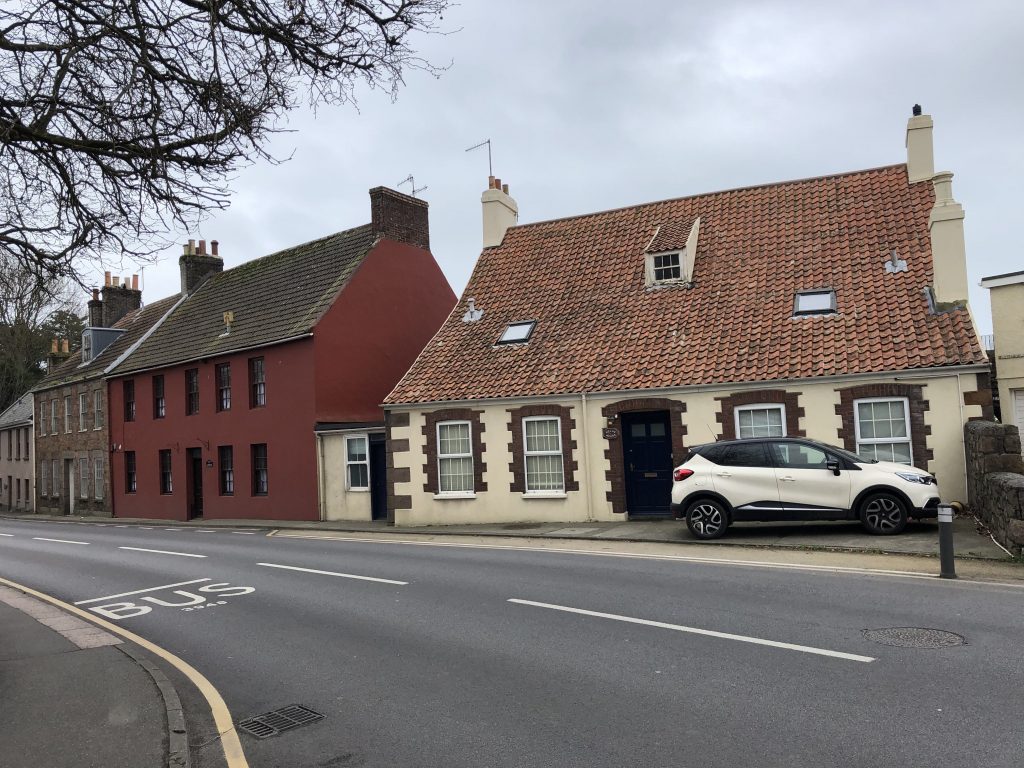
St. Helier is a pleasant town, population c. 34,000, Jersey is made up of parishes rather than towns, the neighbouring parishes blend into St Helier. It’s not as obviously prosperous as one might have thought, with quite a few empty buildings, both retail and residential, but certainly appearing on a par with a prosperous English Home Counties town. Of note, the Major Peirson pub, just of Royal Square, outside of which the valiant Major fell to enemy fire defending Jersey from the last French invasion of British territory (1781). The French invasion force’s commander died inside the pub (of wounds, not drinking), saving the Revolutionaries the trouble of executing him a few years later. We toasted the Major with Kentucky bourbon. The then-Governor of Jersey had allowed himself to be captured, but his failure to fight was more or less overlooked, and he got a pension. Rewarding failure seems to be a well-established British government trait.
There are plenty of clean, working phone boxes in St. Helier, local calls (i.e. on the Island) are free from these boxes, and surprisingly, they have phone books in them. There was no sign of any grafitti or vandalism anywhere on the island, indeed the Sage only spotted some in a public loo in St. Peter Port, Guernsey.

There is a pleasant covered market in St Helier.

St. Ouen’s Bay has a huge beach and a long promenade. Jersey was once home to the fourth largest ship-building industry in the British Isles, it could have expanded, but for some reason they stuck a railway through it, so it could not expand as ships got bigger. Railway and shipyards long since gone. Still, had Jerry got his thieving National Socialist mitts on a ship-building industry, that would not have helped the Battle of the Atlantic, and might have meant routine bombing by the RAF during the Occupation. One thing of note in Jersey, the vast areas of polytunnels, and some impressive effort going into farming even very steep slopes.
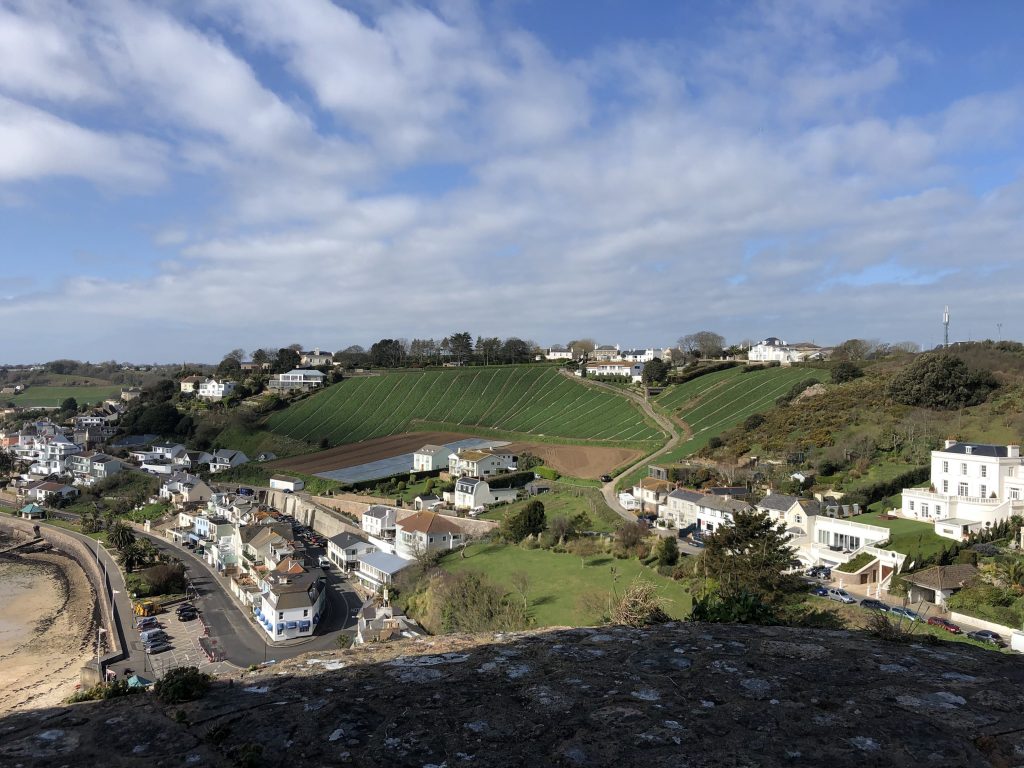
The main sight for us was Mont Orgueil (Mount Pride) castle on the east coast, a 30 minute ride on a Liberty bus, past incredibly rocky bays. The castle is impressive, taking a good 2 hours to look around, with views of distant France, and German additions, observation points, at the top.
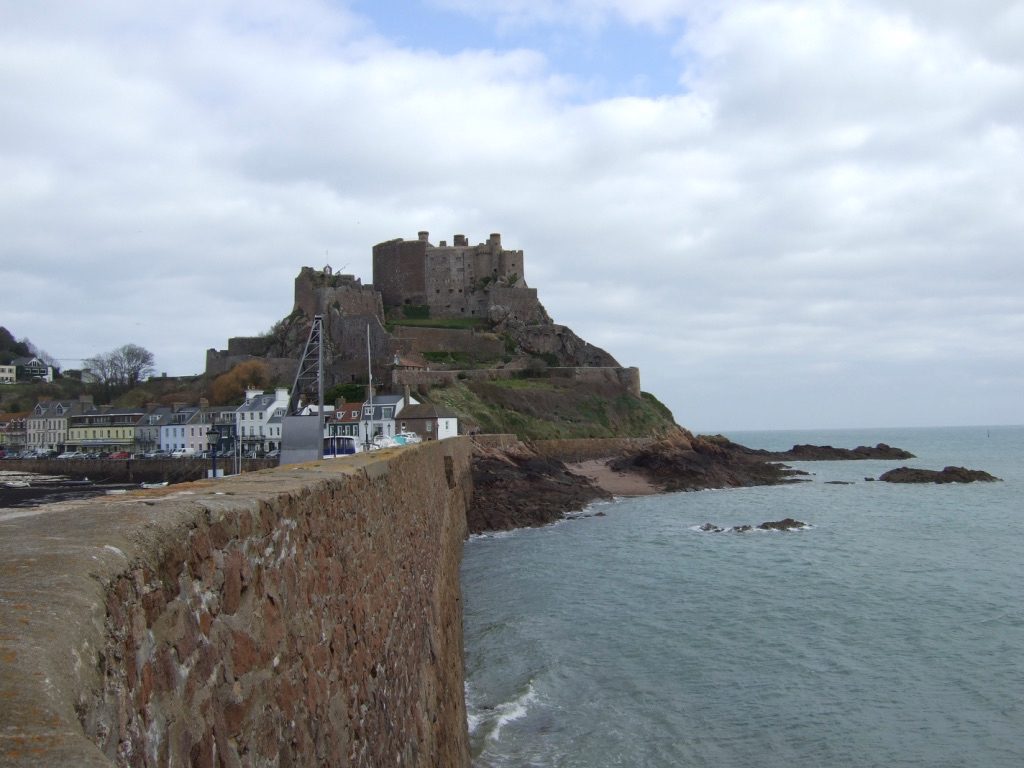

Mont Orgueil was ‘demoted’ in the age of powder, with Elizabeth Castle on an island in the bay outside St. Helier taking over as the main fort. Sadly, Elizabeth Castle (named for the ginger one) was in its close season, so we could not visit.
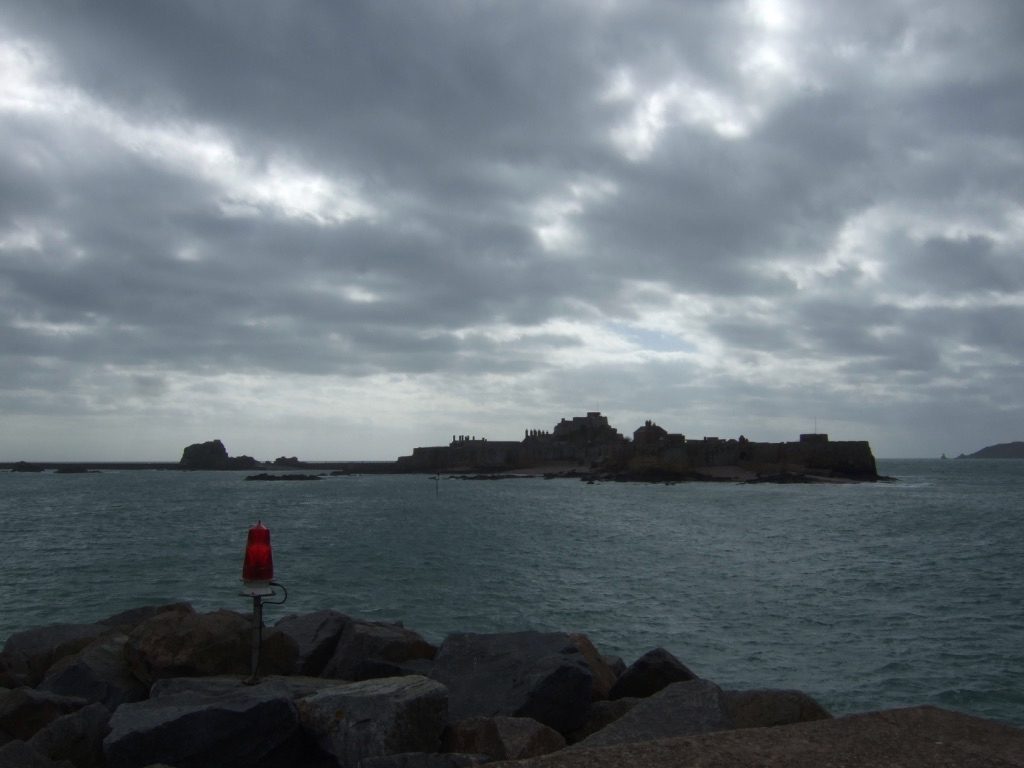
Meals were in the Pomme D’Or Hotel – the German Naval HQ in WW2 -overlooking what is now Liberation Square, in which a 50th anniversary statue commemorates Liberation Day (9th May 1945). The statue is Islanders raising a Union Jack.
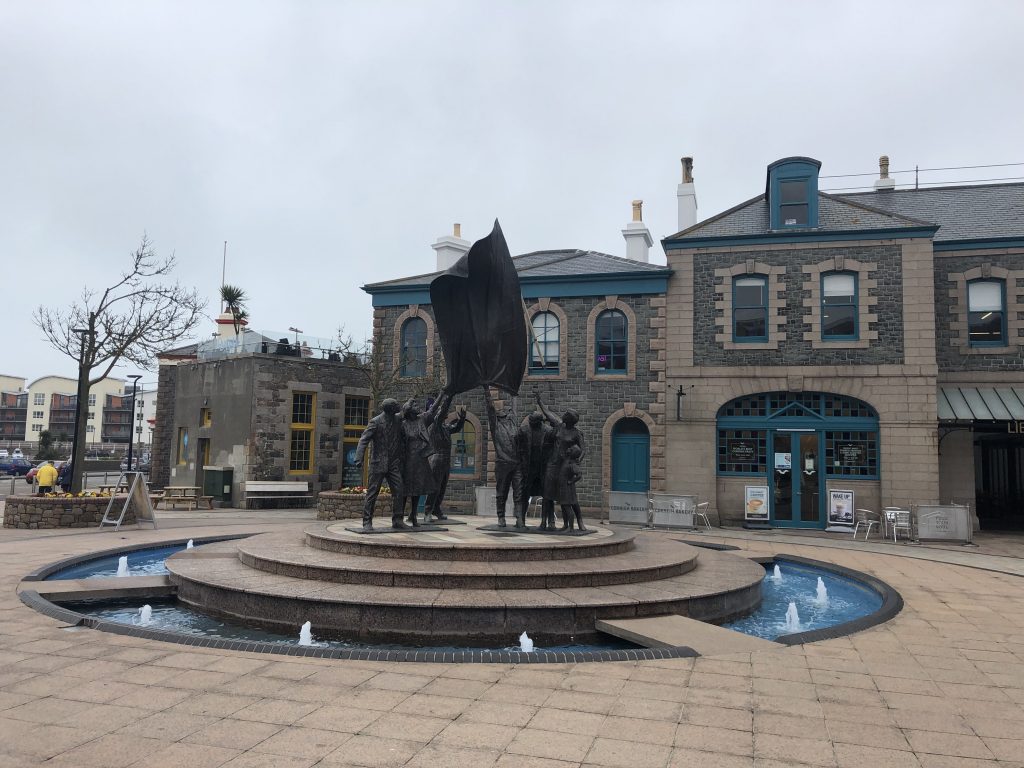
The original plan, Islanders releasing doves, was rejected by the Islanders, they said the starving German soldiers would have long since shot and eaten any doves left by that time.
Our brief stay ended with a bus ride back to the airport for the short flight to Guernsey, a smaller island (25 sq miles) but with a cluster of smaller islands within its jurisdiction, mad Sark with its thieving price controls, the Sarquois appear to have averted disaster for now by buying the power company from the unfortunate owners, and Herm and small Jethou, with Alderney, not liberated until 16th May 1945, so perhaps the last outpost of the Reich’s power, distant on the horizon.
St. Peter Port, the capital of Guernsey, is a fine town, prettier than flat St. Helier, and quite hilly. It has the air of a prosperous Cornish seaside town, but without the pasties.
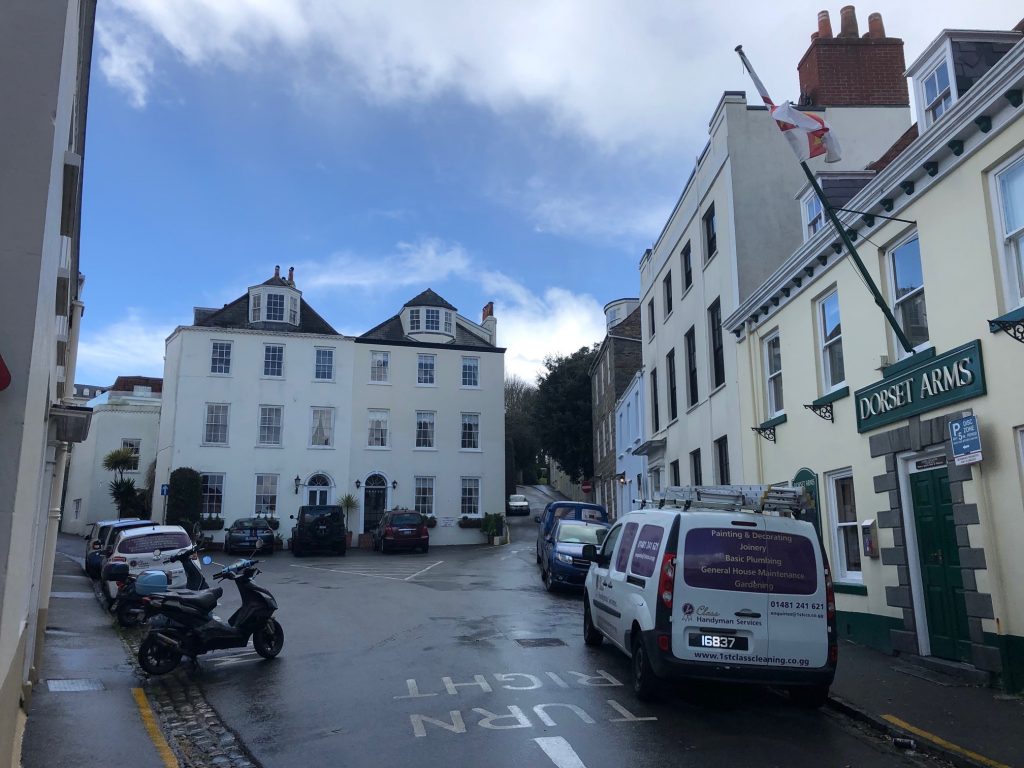
Victor Hugo, the chap behind an unhappy musical, lived here for c. 15 years after exile from France, his house, now owned by the City of Paris, appears to have been done up somewhat.
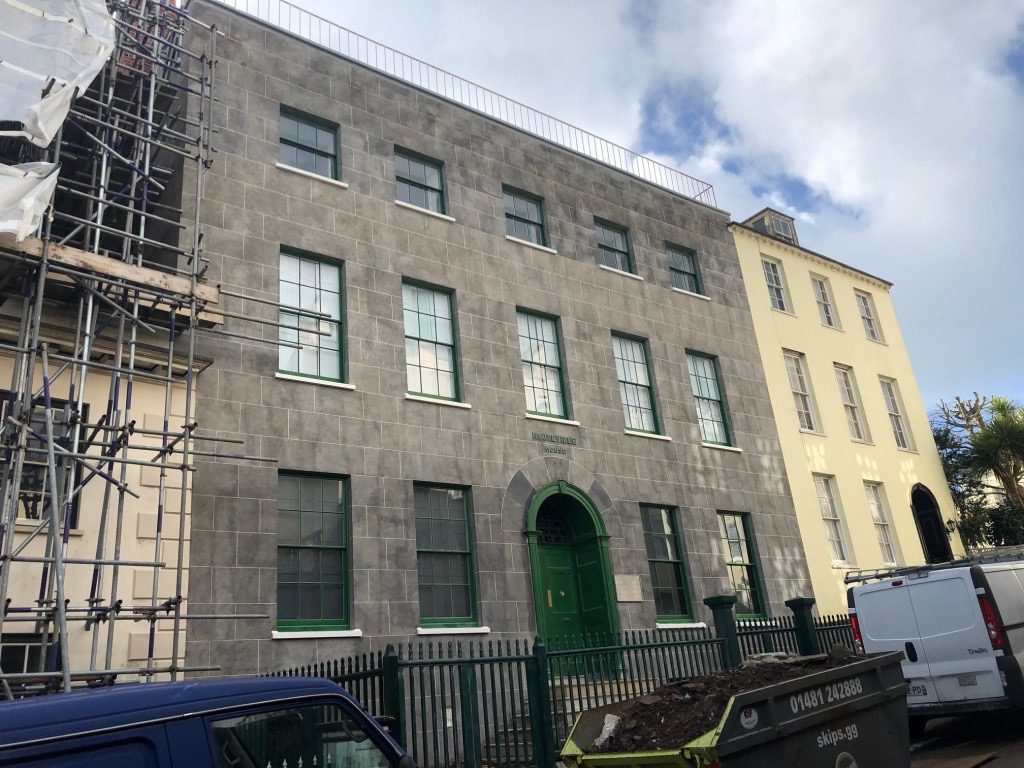
The national beast of Guernsey is (the cow apart) the donkey, the beast fondly memorialised in the capital. In Jersey, they have the toad ‘crapaud’ as their animal, with an amusing monument in St Helier, complete with excerpts of a now-repealed penal code.
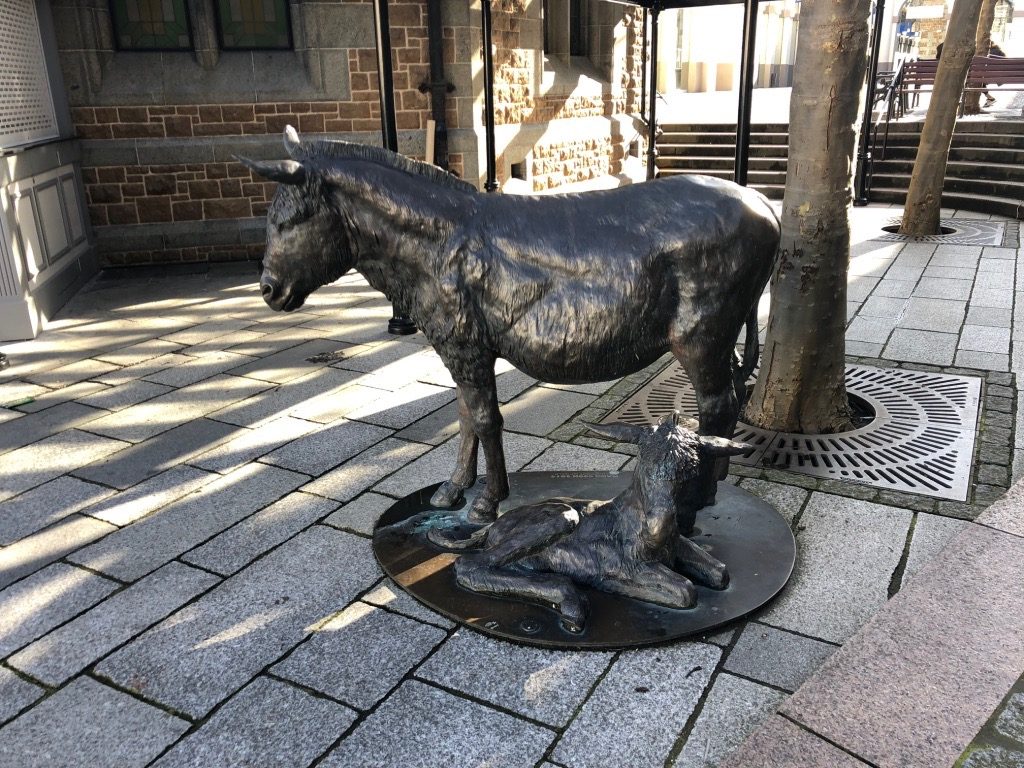
There is a rumour, most likely unfounded (since I have just started it) that Mrs May’s advisers write her speeches in this Guernsey pub.

Out in the bay of St Peter Port is Castle Cornet, once an island, now on a causeway, often seized by the French before gunpowder, and then in the Civil War, held by Royalists against Parliamentarian Guernsey, with Jersey Royalist. Supplied by sea, they pounded around 10,000 cannonballs into St. Peter Port during the war, and were the penultimate Royalists to surrender, after around 9 years holding out. It was closed when we visited, and is much reduced after a lightning strike to the magazine in 1678, when there seemed to be something wrong with their bloody castle that day, as Admiral Beatty might have put it. Today, it is much reduced from its Civil War peak.

What I particularly liked about Guernsey was that you could easily see Herm, Jethou and Sark from St. Peter Port, giving a bit of perspective and sense that the sea was a road rather than an isolating wilderness, here are Herm and Jethou Sark (edit) from the causeway past Castle Cornet.
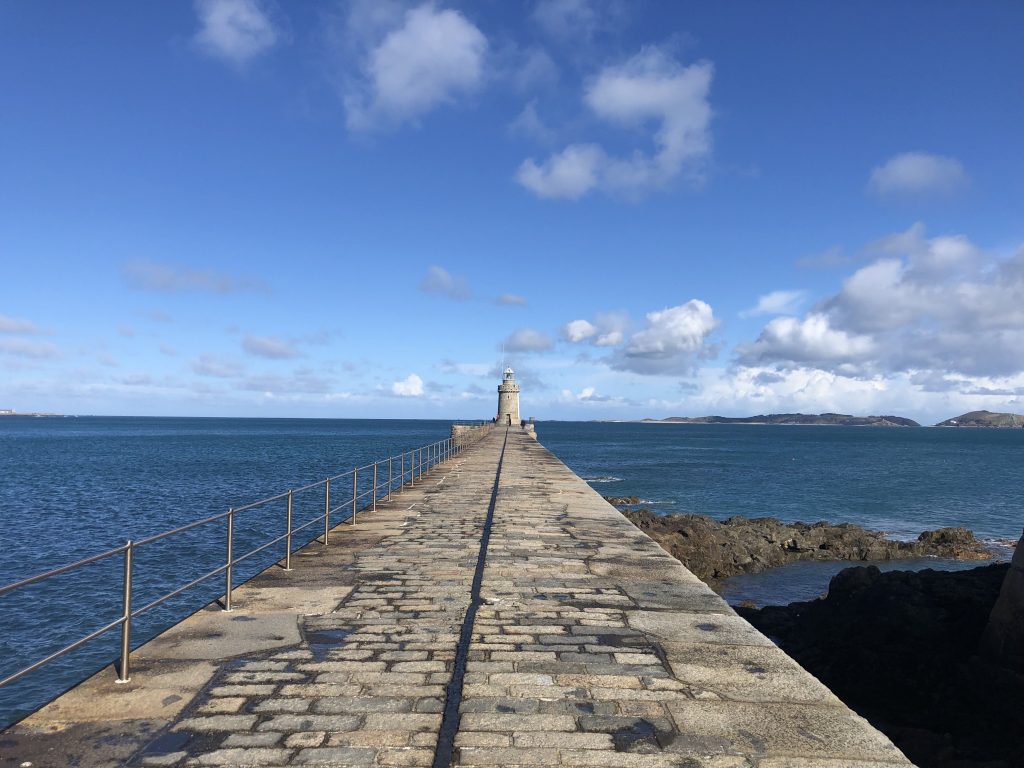
Addendum: A view of Sark (and Brecqhou) from St Peter Port, with the wrath of the weather gods lashing down on their price controls, with Jethou and Herm to the left, and the edge of Castle Cornet in the left foreground.
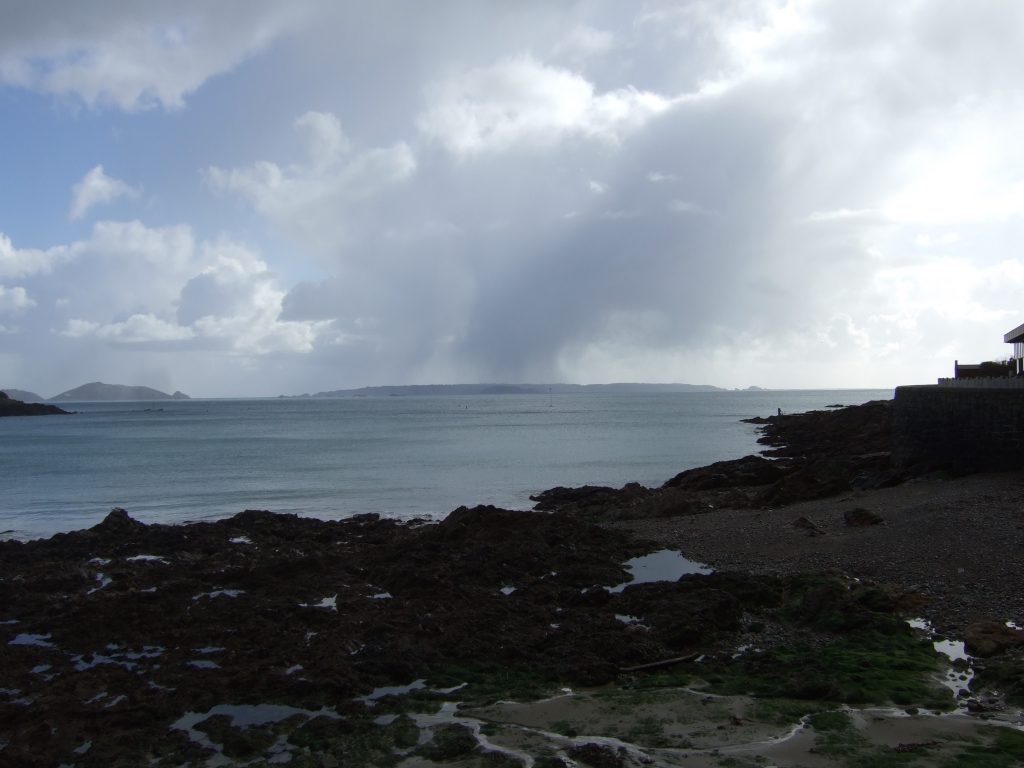
Near the harbour, a statue of Prince Albert, a German visitor who is fondly memorialised. Behind him, is reputedly the pub, the Albion Hotel, that is closest to a church in all the British Isles.
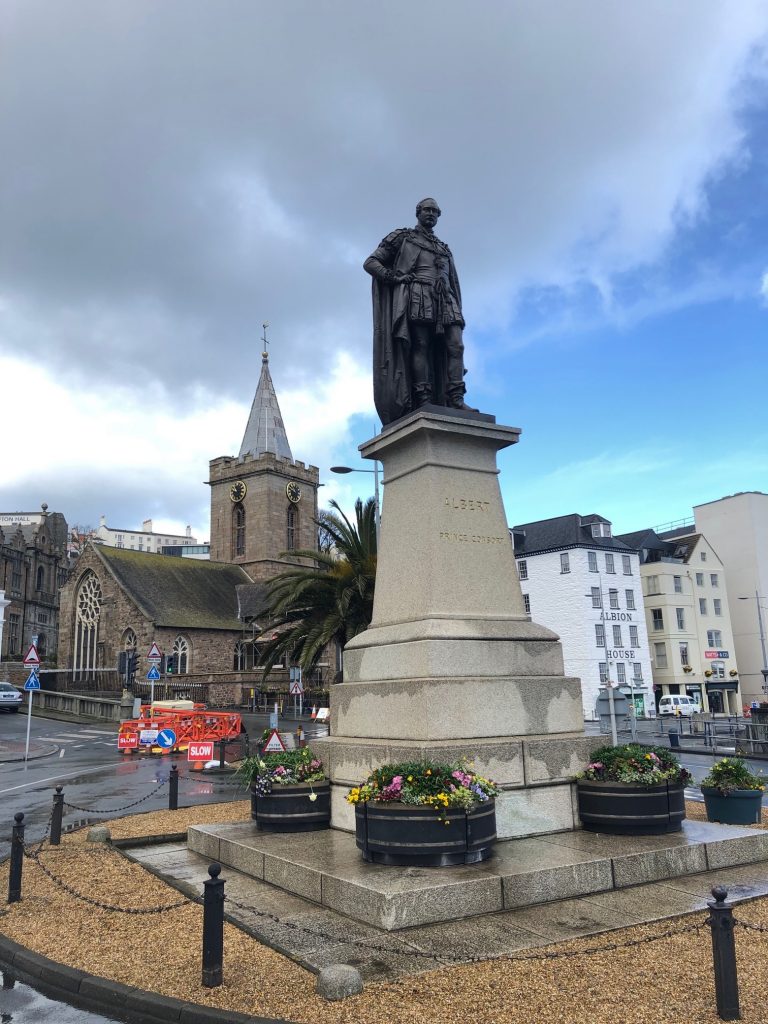
One feature of the Islands is that they have their own respective Sterling bank notes, starting at £1, whilst Bank of England notes are accepted. Thomas de la Rue being a Guernseyman, it’s quite appropriate that he is on one version of the Guernsey note. The Jersey government helpfully points out that by Jersey keeping its own bank notes, that makes money for the government, since when banks run out of notes, they buy them off the government, who make a ‘profit’, so everyone wins, hurrah!
Why it’s important to keep Jersey notes in circulation
Jersey notes that are circulation generate income for the Island. If we aren’t withdrawing Jersey cash from the banks, then the banks would have no need to buy notes from the States of Jersey. This is why the Island benefits from having its own currency.
How paper money creates more money
Jersey’s banks order paper money from the States of Jersey to meet the demand for cash from their customers. Jersey notes enter circulation via the following process:
local banks place an order for cash with the States of Jersey Treasury
the Treasury issues Jersey notes to local banks
in return the local banks pay the Treasury the face value of the cash received
the notes are withdrawn from local banks by Islanders
The money that the banks pay for the notes is invested by the States of Jersey and contributes to the overall running of the Island.
Sadly, despite the proximity to France, M Bastiat’s wisdom haven’t penetrated in St Helier. Still, they are far better than the UK for most things.
Jersey and Guernsey are noted financial centres, with neither having inheritance or capital taxes, and with no VAT or sales taxes in Guernsey, but Jersey has started on the slippery slope of a GST, currently 5% (introduced at 3%), I can only image it creeping up towards the UK’s 20% for VAT. In both Islands, income tax is maintained at the wartime emergency rate of 20%, with Guernsey alone having a tax cap. As for Sark, the Sage wrote this prescient piece in 2005.
Politically, both Islands are a bit of a mixed bag. The first thing that you see in Guernsey airport is a ‘Fairtrade’ declaration, showing that they fail to understand the importance of prices and are, in effect, ashamed of market prices. Both Islands have ‘mindless equality blather’ as part of the public sector default mode, with police concerned about ‘hate crimes’. I can’t help getting the impression that they have no real appreciation that what makes them prosper is (a) low taxes, private property, the rule of law and (b) the state of the UK in comparison.
Guernsey licenses its own air routes and has its own mini-‘Aeroflot’, Air Aurigny (the local word for ‘Alderney’). The airline was ‘nationalised’ by the States of Guernsey in the interests of ‘economic development’, despite a local businessman who runs another local airline offering to buy it. Still, the airline was perfectly pleasant, and they don’t seem to have the customer-repellent habits of Flybe of charging people with slightly over-sized bags £50 to as they take their bags on the flight.
With all the reminders of the German Occupation, there was one horror memorialised in Guernsey that really stuck with me. During the Marian Terror, 3 Protestants were burned alive, one was pregnant, she gave birth in the flames. The baby was rescued, but was then ordered that he be thrown into the flames.
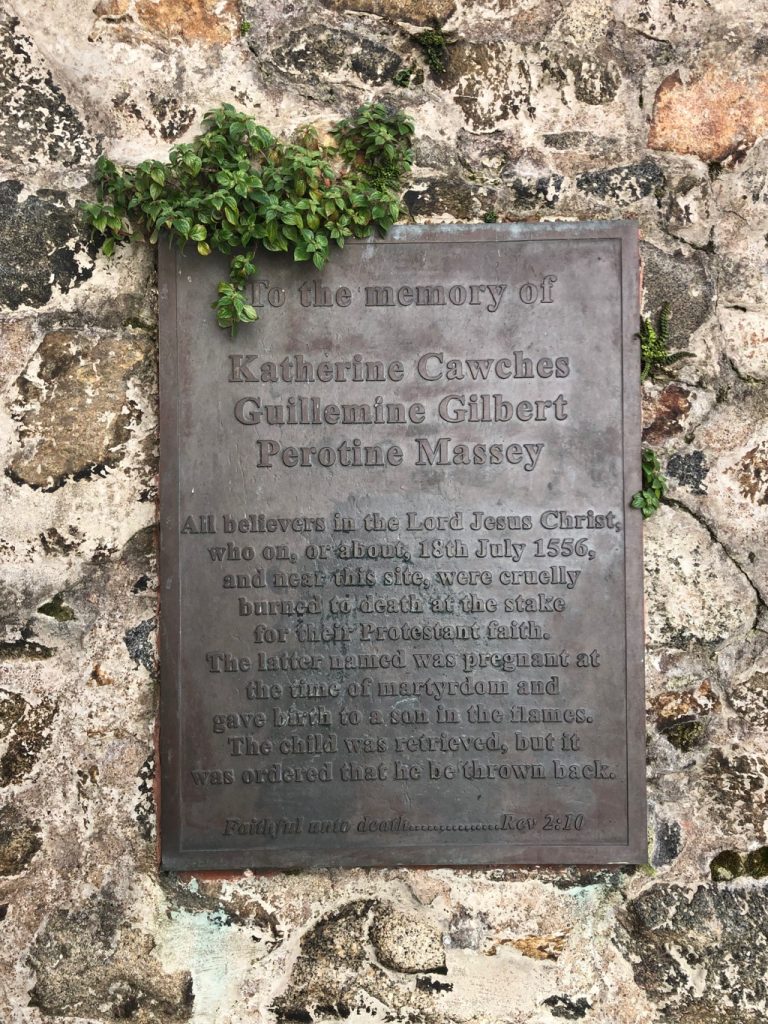
At Guernsey airport, for departure in a field opposite the entrance, I managed to catch sight of a Guernsey cow. I am happy to put Guernsey butter on my toast of a morning. And I got some genuinely duty-free aftershave, 2/3rd of the retail price in the UK. I look forward to returning not too far into the future, Guernsey for preference.

In summary, both Islands are very pleasant places to visit, and a glimpse of how the UK might have been (and might yet be) had they rediscovered the benefits of low taxes and restrained government some 50 years ago.
And finally, in Jersey, another sign that you are not in England. In England, there is in many a town a ‘Magistrates’ Court’ for summary offences (misdemeanours). In St. Helier, it is, despite their being surely more than one magistrate, caught in stone as per the sign below. I like to think that, having been freed of the real Nazis, they are subtly trolling the Grammar ones.
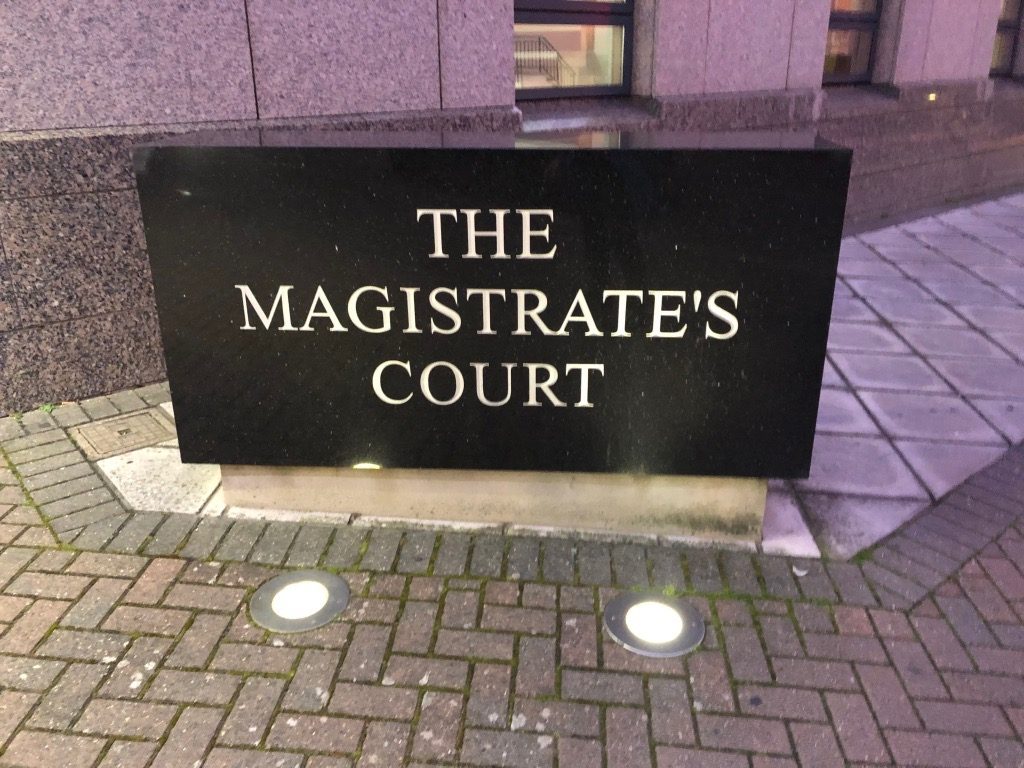




I was most struck by the contrast in views between Jersey and Guernsey.
From Jersey one can see the sea and a vague smudge that is France – and that is about it.
But from Guernsey one can see the other islands – Sark, Alderney, Herm…
The difference really between chalk and cheese – and I prefer cheese.
I would advice people to go on boat trips to the other islands from Guernsey, to see the caves of Sark and so on.
As for the P.C. culture of both Jersey and Guernsey – it appears to be more extreme in Guernsey. which the local government has declared a “Fair Trade” island, and the politicians talk endlessly about “Climate Change” (as if the policies of this small island could change anything about whether or not the sea rises and covers the place).
The chainstore bookshops on both islands are full of same far left demented crap (to use technical and scientific language) that they are in the U.K. – “Becoming” (a ghost written autobiography of Michelle Obama – a person who was put into Princeton to fill a racial quota, and became “famous” by marrying Comrade Barack Obama) – W.H. Smith declares this sort of stuff (and old books by the socialist homosexual Owen Jones) to be “best sellers” – although I doubt that anyone outside the Jersey Marxist Collective (who had such influence over the Occupation museum – pretending that the German National Socialists called themselves “Fascists”, and leaving out any mention that the Marxists SUPPORTED the Mr Hitler and the Nazis from 1939 to 1941 – the start of occupation being in 1940).
The best thing to do is to ignore the Frankfurt School of Marxism culture of the islands (other to laugh at capitalist “tax havens” trying to be Marxist “Social Justice Warriors”), and to concentrate on the traditional rural scenes and old buildings (more on Guernsey than Jersey).
As for castles – Jersey (not Guernsey) clearly has the edge.
The young people of Jersey (boys and girls) seemed to be more interested in the business fair (a big tent full of eager young business people) – rather than the SJW Marxism the local media and politicians (and no doubt the schools) push at them.
It can only be a matter of time before we see another marriage of a duke to another duke, now that we have same sex weddings.
Of course, if a future king marries a man that spouse will be a mere prince, as our royal family still clings to the old, sexist rule whereby a female spouse of a monarch is a queen but a male one is not allowed the top title for his sex.
Great article! Thanks for writing it.
How is the health care system in the Channel Islands structured? I haven’t been able to figure that out.
Let me guess – Hideously white? A shocking lack of diversity?
It looks as if there is only one magistrate on Jersey.
Perhaps there’s not much crime, what with the lack of “diversity”.
Both Jersey and Guernsey have “free” health care Brian Combs – and have done since the 1940s, however ONLY for legal residents.
In the United States a visitor or illegal immigrant can just turn up at a hospital and demand “emergency” treatment and then vanish (try finding them to deliver a bill). This is NOT the case in Jersey or Guernsey – so do not visit without health cover.
Revelation – there are non white people on both islands, and a quite a bit of cultural diversity.
For example, there was a Portugese PROTESTANT Church on Jersey – I do not think I have ever seen a Portugese PROTESTANT Church before.
Brian C, An excellent question. In short, both Islands have their own healthcare systems, there is no NHS, and as far as my limited research before the trip took me, I understand that they have ended the reciprocal arrangements with the UK for the provision of healthcare, so as a visitor you should have travel insurance for healthcare costs. A British politician would probably want you to believe that the Channel Islands solution to healthcare is high cliffs, but this seems not to be the case. In Jersey, they seem to pay for most treatment but with free emergency care, and established visitors seem to get some rights after 6 months. In Guernsey, it seems to be simliar.
In terms of ‘diversity’, both Islands control their own immigration, and despite being British citizens, they do not have the right to work in the EU or EEA member states, and their passports are endorsed accordingly, unless they have e.g. a British grandparent or 5 years residence in the UK. Both Islands are in the ‘Common Travel Area’ with the UK and Ireland, so no passports are needed, just approved photo ID for a flight or boat trip, but they have (pretty relaxed if not notional) Customs checks when you come in from outside their respective areas.
To reside in Jersey as a ‘tax exile’, I believe that you need specific permission and a permit from their government, whereas Guernsey simply rigs its housing market with an open market where if you buy a house in that category and can otherwise reside there, that is fine, or if you are a guest worker, after a few years, you are eligible buy a property on the closed market for locals.
Both Islands have large Portuguese communities, I had a nice chat with a Portuguese shop-keeper in Jersey, and there are quite a few East Europeans, with a few specialist shops in St. Helier in the ‘kebab district’, in St Peter Port there was a closed Latvian grocers. Guernsey has an Orwellian-sounding ‘Population Management‘ law which whilst it sounds as if healthcare could come under its remit, seems confined to planning the workforce. There were quite a few Irish people working there as well, e.g. a taxi driver, waitress.
I’ve done some googling and it appears that Jersey does only have one magistrate.
pete,
That would be a relief, in the Royal Court, the main court, there are 12 jurats, who are lay assessors of fact, so I thought that there might be more than one Magistrate. They do appear to have ‘Magistrates Sentencing Guidelines’.
Clearly, you mean this sentence to be derogatory.
Which of the two terms do you feel most strongly derogatory about, between “socialist” and “homosexual” and why have you mentioned both?
Neonsake,
There is in your question an implicit assumption that the comment you have quoted – which you term a sentence, but which is, if you read it carefully, and I am I hope not boldly assuming that you can, two adjectives appended to a proper name – is derogatory. My reason for saying this is that you then go on to presume that both adjectives are regarded as derogatory by the author of the comment.
It does not appear to me that you might consider that in context, as it seemed to me, the comment was aimed not at the aformentioned socialist, but at those who, one might say, fawn over the particular socialist author, as opposed to the many other socialist authors available, because of his particular sexual orientation as statute defines it, rather than being derogatory about that author on the basis of his orientation? I took the comment as a dig at those who might be perceived to have put forward the aforementioned author, ahead of many others available, on the basis of a particular protected characteristic, as defined in law, and taking as a hypothetical comparator, a socialist of similar stridency who did not have that characteristic, i.e. those publishers etc. would ignore other authors, on the basis of them NOT having that particular aspect of that characteristic. It is therefore clear that the post was a cri de coeur against basing favouritism on a protected characteristic, whether the presence or absence of a particular aspect of it, or any other possible aspect of that as a protected characteristic, rather than the characteristic itself.
I’m really struggling to parse that paragraph. So, and I apologize for being graphic here…
Let me put this another way. Sometimes, I like a bit of cock. That has no bearing on my basic desire that the government get the f*ck out of of my business.
Are you guys gonna give me shit about my sexuality?
Straight (rofl) question?
(At the moment, seems so)
I have to say, the article and comments are riddled with inaccuracies and over simplifications. But this does not bother me so much. What does bother me is if right wing old English folk move to our lovely islands, expecting to be revisiting the 1950s. The islands really are not like this; they are liberal, free thinking dynamic international centres.
Please stay away if you think otherwise….
I would have to agree, Mr Ed appears to be more like a victorian judge than a 21st century chap. And I probably would agree that there was the intention to denigrate homosexuality, which is odd considering how many upper class judges started off at oxbridge….
I read it more as speaking of the Diversity Checklist approach. “He’s not just one of us – he’s TWO of us! – so he must be a good author.” The phrase “socialist homosexual Owen Jones” indicated that, in the PC mind, there were two wonderful reasons – aside from literary or intellectual merit, of course – to read him, and to give him pride of place in a bookstore.
And, NS, just so long as it isn’t socialist cock . . .
Mr Ed,
Fascinating travelogue. I wish I could’ve been with you guys, but you forgot to get my airline ticket. :>(
Thanks so much for the photos and the accompanying historical details. –In other words, for the whole posting.
. . .
[I wonder if it is possible to buy butter imported from Guernsey. I see by the Great Foot that the relatively small Guernsey stock here (I assume) has suffered from hybridization with Friesian and other lines of cattle. I am saddened, if this is true — and I’ll bet it is — but unsurprised.]
“I can’t help getting the impression that they have no real appreciation that what makes them prosper is (a) low taxes, private property, the rule of law and (b) the state of the UK in comparison.”
This is the sad truth.
Re Jersey, the education makes for a very PC culture. And the politics moving fast to the socialist flavour. Politicians only been a paid career for sort time, but already huge cultural changes. Health and education is essentially free for nationals. Lots of diversity, if you count east Europe and Madera.
Tax not much different for a low to middle paid type than other western nations. And IMO higher taxation coming, via probably non income tax ways.
But it is my favourite place.
bobby b – thanks for the clarification, that makes much more sense, and I agree. I also suspect that that’s what Mr Ed was conveying, viewed through the lens of your comment.
I’m often mildly surprised that minority groups, including my own, are in favour of more government involvement. Given our history of legal oppression, any move towards giving government more powers only opens the door to that oppression being made law again – witness Russia’s anti-gay laws, and Cuba’s purging (admittedly 70 years ago) of gays.
Your comment is much appreciated.
Expat Guernseyman yer.
Nice article, and it’s interesting to see how the place has changed in the 35-odd yers since I left.
Two minor corrections.
In the picture of the Castle breakwater, the islands you can see are Herm (left) and Jethou (right, with big white house). Jethou is private, but you can easily get a 20-minute boat trip to Herm, which is a nice day out.
And in the picture of Prince Albert, the pub in the building marked Albion House, very close to the Church, is called the Kozy Korner.
(In that picture, you see a palm tree… it shows how Guernsey has mild winters. In most parts of England, that tree would never have survived.)
Complicating your rather unjust (in my mind) denigration of Mr. Ed is the fact that the phrase at issue wasn’t his.
Complicating your denigration of the use of the phrase at all is the fact that a contextual reading of what Mr. Marks said makes it clear (to me, at least) that he was referring, not to some homophobic derision, but to the left’s use of diversity labels as recommenders, in place of merit. “It must be better, he’s gay!” is what they convey when mediocre authors with diversity points are promoted over better writers who might simply be OWG’s. (Old White Guys, I should specify.)
And, finally, speaking (out of turn) for OWG’s, we have lived through several very differing eras in terms of old tribal prejudices and practices. I was born and raised into a society where everyone – everyone – hated gays. Fag jokes, homo jokes, queer jokes, you name it – and that was what our parents and teachers and the paragons of our society preached to us.
I, like many OWG’s, was in my early teens when the Stonewall was raided, which means that I was in my early twenties before any kind of social acceptance began to be discussed. The phrase “formative years” has real meaning. Heck, I was fifty when Obama changed his stance regarding gay marriage. It’s been a long progression.
So, in no terms are us OWG’s “21st century chaps”. We’re 20th century chaps who, I’m sort of proud to say, have done well in casting off a lot of ingrained, but wrong, thinking. And it’s a bit galling to hear someone who (I’m guessing) has had the luxury of living through one seamless and undisputed philosophy abuse us for the struggles we’ve gone though to get here.
(Although I’m sure that my grandfather would have appreciated your joke about sexual practices at all-male schools. Gay jokes get old . . . )
Neonsnake,
Please be assured that the remark that you complained of was not aimed at denigration as you (perfectly understandably) understood it, and bobby b’s take is on the mark.
CJ Nerd,
Thank you for pointing that out, my error, now corrected, we could clearly see distant Sark which is obviously further away that Herm (a nature reserve) and Jethou (not sure what it is now), and I shall append a picture of Sark taken from the pleasant cliff walk (in-between hailstorms) going south from St . Peter Port. We did nearly go into that pub, but chose another one just along the harbour front.
bobby b,
Thanks for your contributions. It seems that I am being criticised for something I haven’t said by someone who appears to struggle to distinguish blog from comments, your ‘defence’ is excellent without even taking instructions from your ‘client’. I can’t quite see how the extrapolation about judges and Oxbridge in that post came about. If the insinuation is that I did go to Oxbridge, I have no memory of doing so, which could be a whole 3 years missing from my life. If I were to be a judge, I would hope to be in the mould of Coke, not some Victorian mired in the Blackstone heresy.
I meant to add that the islands are on approximately the same latitude as the North West Angle of Minnesota, slightly over the 49th parallel but with considerably milder winters.
Partly, it is merely an example of Burke’s point that all sorts of people, from Kings to revolutionaries and all between, are tempted to take the “degenerate, tricking, fallacious short-cut” of mere force (breaking old restraining laws, declaring their force the law, etc.).
Whether it is a liberal jew being surprised to find how anti-semitic ‘their’ party has become, or the surprise that Ernst Rohm (head of Hitler’s storm troops and loudly-prominent member of the German League for Homosexual Rights) felt on the night Hitler had him shot, it is truly pathetic, but not peculiar to those groups, to see such people turn disproportionately to whoever promises to use force to make them respected. (Thomas Sowell notes the phenomenon but sadly has never, AFAIK, devoted time to analysing it. I find Hannah Arendt’s studies interesting but incomplete.)
Those people from such groups are often used as the ‘storm troops’ to batter down the laws protecting them too from what will happen when they have served their purpose. Once they have – once they have got the party into power – a more complex dynamic emerges. On the one hand, they discover how discardable they are, but in part that is because ‘members’ can be recruited by power itself. Hannah Arendt (Eichmann in Jerusalem) notes that as the SS replaced the SA in running the concentration camps, there was a simultaneous attempt on the one hand to restrict those whose cruelty to the (almost-all male at that time) prisoners was a matter of personal orientation instead of enforcing orders, and on the other hand
The unhappy SS guard that Hannah quotes above could have been an unthinking Nazi if only his personal reactions had not told him something was terribly wrong. For this very reason, she notes that the people who were put in overall charge – people like Eichmann and Hoss – were promoted because they belong to neither of these two kinds but were “terrifyingly normal” in ways that ensured they would do the ideology’s will, not their own. She describes the SA’s hatred of, and cruel self-indulgence towards, their prisoners, as “the last remnant of humanly-recognisable feeling”. (And not for humane reasons; it is universally reported that after the SS replaced the SA as concentration camp guards, the prisoners were at first very relieved, since the brutal camp code was better than the SA’s undisciplined self-indulgence.)
[All quotes are from memory (rather unpleasant memory in the case of the quote of a Hannah Arendt quote). ]
]
“I’m often mildly surprised that minority groups, including my own, are in favour of more government involvement.”
Somebody – I forget who, it was many years ago – once explained to me why it was that kids who were themselves bullied and abused at home so often went on to become bullies and abusers themselves.
It’s because children learn how society works from the people around them. The abused child learns that using force is the way to get what you want. The dynamic they learn is that the person who is stronger or scarier than the other can make the other do what they want. So they want to be that person. They want the power.
Their understanding of the world is that there are masters who command by force and there are slaves who obey out of fear, and given the choice between the two, it is far more enjoyable to be a master. They have never known any other way of living.
Orwell said: “Always, at every moment, there will be the thrill of victory, the sensation of trampling on an enemy who is helpless. If you want a picture of the future, imagine a boot stamping on a human face — forever.” The reason that it lasts forever, despite all the revolutions and reforms, is that people are only ever fighting over who gets to wear the boot. They are not fighting to get rid of the boot altogether.
It’s human nature. γνῶθι σεαυτόν. There is a road out of the trap mankind finds itself in, but few have the understanding to take it.
Niall, NIV
I was actually being a little tongue in cheek, so your two detailed and thoughtful replies are much appreciated.
I mentioned both “Neonsnake” – because Mr Jones is what used to be called a “professional homosexual”, much like the old character of the “professional Yorkshireman” or the “professional Scotsman”, Mr Jones makes a big thing of his homosexuality and uses it to get advantages for himself. I did him the favour of mentioning the very thing he LIKES being mentioned – after all he mentions it (indeed trumpets it) all the time. But he has no need to THANK me – I did out of the kindness of my heart.
Oh by the way – do not confuse me with someone who would be upset about being called a “homophone”. Actually my own interest is in people who use their sexuality (or where they are from – or whatever) as a way to “get on” that is nothing to with their talents (or, in the case of Mr Jones, his total lack of any talent) – but if you want to assume that I am bigot who hates you for sexuality, go right ahead. I do not care.
Oddly enough we are all told we must not be “Islamophobic” – and a legal rule from Muhammed himself is that those who engage in male homosexual acts should be killed, both the active and the passive partner. Now I happen DISAGREE with that – but Mr Jones (and yourself?) might be in line for a charge of “Islamophobia”. Are you guilty of such “bigotry”? Mr Jones himself is not shy of calling other people “Islamophobes” – so surely he must, if he is consistent, accept the right of the forces of Islam to execute him. I do NOT wish to execute him – but Islamic Law deals with the matter, and we must not be “Islamophobic” as Mr Jones says being an “Islamophobe” is a very bad thing.
Would it not be “colonialist” and “imperialist” as well as “Islamophobic” for me to intervene to defend Mr Jones against followers of Muhammed who just want to carry out their law (their law – NOT mine) in relation to him.
Do I mean to disparage Mr Jones by calling him a socialist? Well of course I do (most certainly Sir) – as socialism is total nonsense, although I suspect that Mr Jones pushes it for reasons of personal advantage. Which is understandable (although utterly contemptable) due to the massive power that socialists have in our society – especially in the education system, the cultural realm, and the media.
Paul Marks – cheers for the reply.
No, I don’t want to assume that. I don’t make assumptions, I want clarity.
I’m, against my own will and wishes, part of a segment of people who are treated differently by society, and also under law (in some ways to my advantage, in some to my disadvantage. The balance is “advantageous”). I don’t want to be treated with kid gloves; nor do I expect to be lumped in with people like Mr. Jones because we share a characteristic. There are people who see me as a symbol of PC. Just because I’m bi, people expect me to want PC treatment; it also means that many things I say are interpreted through this strange lens of “oh, you’re bi, you’re just being PC” (for example, any comment I make on gay marriage will be viewed as possibly being PC)
As maybe an example of who I am, I found bobby b’s “as long it’s not socialist cock” to be a) good humoured, and b) genuinely funny, it made me snort in appreciation.
(I’m not positive that I’ve articulated myself clearly there, so please ask if I’ve been unclear)
Now – there’s a strain of homophobia which can be prevalent in “libertarians” – or libertarians in name only, who oppose government interference in economic matters, but are happy to let the government interfere in family matters and personal decisions. It’s a particularly tiring thing, since it often takes the form of “I don’t mind them (gays), I just wish they wouldn’t get so uppity when someone says something they don’t like. People have the right to free speech!” – which is technically true, but would hold more weight if “that type” of libertarian followed it up by disagreeing with the homophobe, rather than defending their right to free speech and then leaving the homophobic comments unchallenged. I’d rather “that type” of libertarian would skip the “I don’t mind them” bit – eventually when pushed, they WILL come out and say that they don’t like homosexuals/bisexuals/transsexuals (“it’s unnatural”, or harmful to traditional family values, or whatever), and don’t think that civil liberties should extend to them. I’ve encountered enough to be wary. So, I don’t assume homophobia, but I have experienced enough of it that it makes sense for me check.
My reason for asking so blatantly upthread is that I’m new (or it’s been so long since I’ve been here that I might as well be new), and I’ve been trying to ascertain which type of libertarian is most common on this site.
As for your comments on Islam, if I’ve understood them correctly:
When you said ‘(and yourself?) might be in line for a charge of “Islamophobia”‘, do you mean that I’ve committed, uh, acts contrary to the teachings of Islam, and that Muhammed would believe I should put to death? If so, then, yes, I have.
Yesterday there was news that Brunei have brought back stoning for homosexuals.
Are you asking what I think of Islam? I think the answer would be obvious…
(truthfully and in the spirit of openness, I don’t condemn all muslims. It’s not something that’s easy, but I don’t condemn the many muslims I work with in East London, all of whom have gay friends, some of whom know I’m not straight, and are generally lovely people. These would be the “hypocrites” you spoke of elsewhere, I guess. I don’t try to convert them, nor often do I question their religion)
As a follow-up question – if it was me (and you knew I was bi) saying “Islam is a disgraceful, backwards, medieval barbarity” – would you assume that I’m saying that because I’m bi, and because I only care about how it treats my kind (in which case I would be being arguably PC) – or would you assume otherwise and that I hate it for a broad range of reasons?
(that’s not a leading question, it’s a genuine one that occurred to me as I was writing – it’s similar to the gay marriage question – am I regarded as PC because I have skin in the game?)